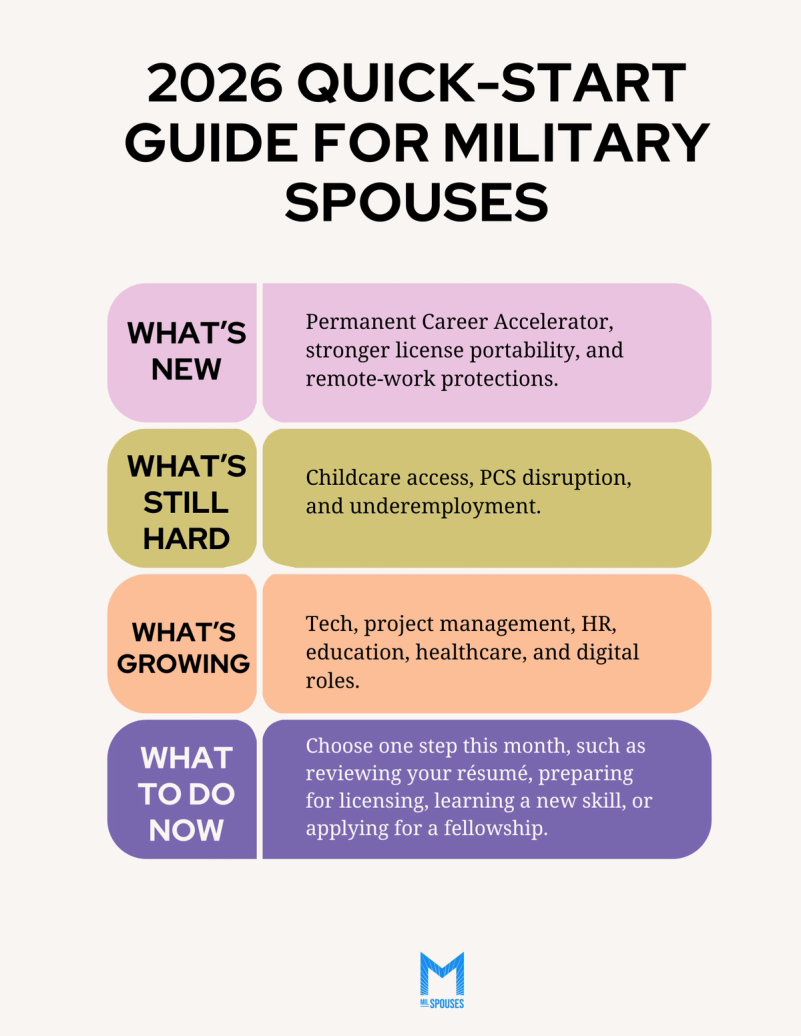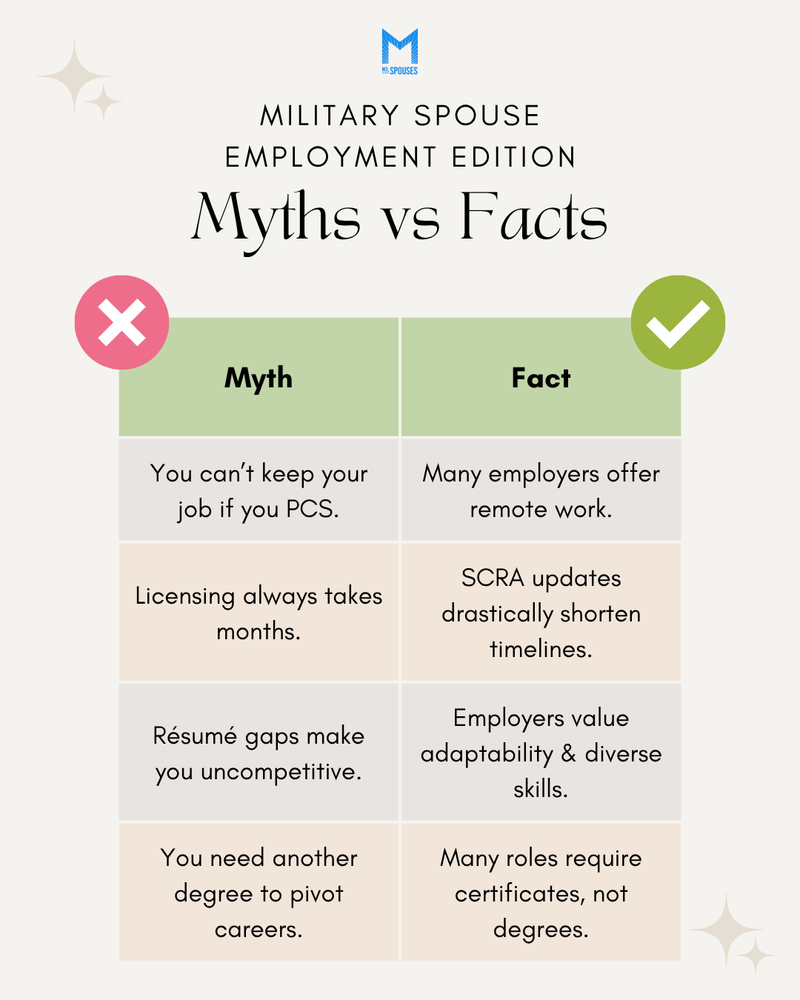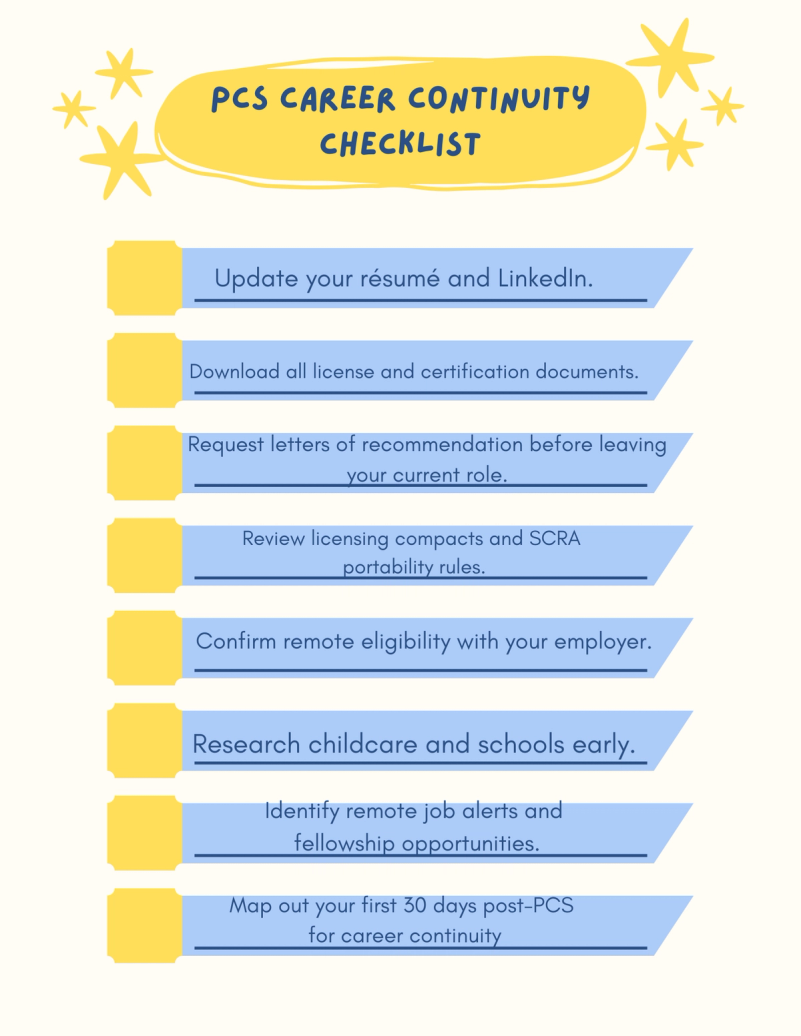WHAT’S NEXT IN MILITARY SPOUSE EMPLOYMENT? UPCOMING SHIFTS IN 2026
COMMENT
SHARE

ADVERTISEMENT
When you’re a military spouse, the boxes you take with you from station to station don’t just hold your home. They hold every version of your career that didn’t get the chance to grow.
The job you loved but had to leave. The credential you had to recertify, again.
The interview you nailed but couldn’t accept because orders dropped. The résumé that reflects every move instead of your actual talent.
In 2026, military spouse employment undergoes real, practical changes: permanent fellowships, improved license portability, and stronger remote protections are now a reality, supporting careers that move with you every time you relocate. This isn’t just wishful thinking. These changes are backed by new policies, data, and shifts in how employers act.
Why 2026 Marks a Real Turning Point
For years, the numbers barely budged. The Department of Defense has repeatedly reported military spouse unemployment at around 20 percent, which is much higher than the civilian unemployment rate.
Underemployment is also widespread, and childcare shortages continue to push spouses out of the workforce.
Blue Star Families research shows military families experience food insecurity at rates above national averages, driven in part by inconsistent second incomes and repeated PCS-driven job loss.

But underneath those challenges, a shift has been building. Nearly 40 percent of employed spouses now have remote options. 64 percent report flexible schedules. And since the pandemic, employers have better understood virtually distributed teams, interstate hiring, and the overall impact of PCS on careers.
In 2026, three major developments converge:
- A permanent Career Accelerator program
- Expanded professional license portability under SCRA
- New remote-work protections in certain federal roles
- Together, these changes make the job market more manageable for military spouses.
Nobody Prepared You for Military Life
But we can help. Join over 100k spouses already getting the advice, resources, and military tea they need to thrive.
What the Data Reveals About Military Spouse Employment
The Institute for Veterans and Military Families (IVMF) estimates unemployment among active-duty spouses at 8.83 percent based on 2023 Census data. In contrast, DoD survey-based findings put military spouse unemployment closer to 20 percent. Both estimates show that spouses experience much higher unemployment than their civilian peers, regardless of the measurement used.
PCS moves remain a major hurdle. Spouses who relocated within the last year consistently show higher unemployment, longer job searches, and reduced access to childcare.
Childcare access remains a foundational barrier. Many installations report long waitlists, forcing spouses to reduce hours or pause employment.
Financial strain persists. Research from Blue Star Families highlights elevated food insecurity among those with unstable employment.
Perhaps the most sobering metric: roughly one in three spouses report preferring that their family leave military service — citing employment challenges as a top reason.
Real Spouse Snapshots
- A Navy spouse in California maintained her federal position after a PCS due to remote-work protections, a first in her family’s service life.
- An Army spouse who completed the DoD Career Accelerator fellowship transitioned into a permanent HR role that now moves with her.
- A Marine spouse used updated license portability rules to continue her counseling practice immediately after PCS, avoiding months of lost income.
These examples come from DoD releases, IVMF case studies, and BSF reports. They show that policy changes are already making a difference for real people.
From Pilot to Permanent: The Career Accelerator Arrives
The Military Spouse Career Accelerator Pilot (MSCAP) created a pipeline for 12-week, DoD-funded paid fellowships. Its success was striking: high completion rates, strong hiring outcomes, and employers willing to convert fellows into permanent roles.
In January 2026, this became a permanent Career Accelerator program. A long-term, fully funded pathway into portable, high-demand careers.
What this means for spouses:
- New résumé-ready experience
- Access to remote-friendly industries
- Employer buy-in because DoD funds the fellowship period
- A consistent, non-PCS-dependent career on-ramp
This change means spouses no longer have to keep starting over with each move.
ADVERTISEMENT
Remote Work, Flexible Schedules, and License Portability
- Remote work: Nearly 40 percent of employed spouses now report having remote options, a dramatic shift from pre-pandemic trends. Some federal roles now allow approved spouses to remain remote after PCS.
- Flexible schedules: 64% of spouses have flexible scheduling, enabling balance during deployments, childcare gaps, and unpredictable military cycles.
- License portability: SCRA updates in 2023 and 2024 strengthened license transfer rules. Combined with expanding interstate compacts in nursing, education, counseling, EMS, and more, spouses in licensed professions face fewer interruptions and shorter downtimes.
These three forces define the modern military spouse career path.
Career Strategy Matrix: Where the Best Opportunities Are
High Portability + High Demand Roles:
- Project management
- Human resources
- Cybersecurity
- Data analysis
- Digital marketing
- UX/UI design
- Cloud support
High Demand + Licensing Required (Now More Portable):
- Nursing
- Education
- Mental health counseling
- Social work
- Real estate
- Skilled trades
Emerging Strong Opportunities:
- AI-assisted customer support
- Digital operations and workflow management
- Government contracting and compliance
- Content and communication strategy
Salary Snapshot for Portable Careers:
- Project Manager: approx. $98,000
- Cybersecurity Analyst: approx. $120,000
- HR Specialist: approx. $67,000
- Data Analyst: approx. $74,000
- Digital Marketer: approx. $70,000
- UX Designer: approx. $85,000
These are median national BLS figures to help spouses evaluate income potential.

Five-Minute Skills Gap Audit
Ask yourself:
- What skills do I use weekly?
- Which of these are portable?
- Which are in high demand nationally?
- Which certifications would increase my earning power?
Many spouses don’t realize how valuable their current skills are or how easily they can upskill in any area they want.
Military Spouse Digital Tool Stack:
- LinkedIn Learning
- Google Career Certificates
- Coursera
- MySECO assessments
- USAJOBS filters for spouse preference roles
- O2O (Onward to Opportunity) career training
- DoD-approved remote fellowship listings
These tools help spouses build new skills, find jobs, and keep their careers on track.
ADVERTISEMENT
Choose Your Path: Quick Career Selector for MilSpouses
- If you want a fully remote career: project management, data, digital content, HR
- If you want a licensed portable career: nursing, teaching, mental health, or real estate
- If you need maximum flexibility during deployments: hybrid or fully remote customer success, HR, and communications
- If you want to pivot industries: Career Accelerator + short-term certificate programs
- If you want stability and long-term federal growth: USAJOBS spouse preference roles

For years, spouses have been expected to solo-manage the home while giving up their own careers. You’ve dealt with waitlists, starting over, pay gaps, licensing issues, and many nights alone during deployments, all while trying to keep your career going.
In 2026, things start to get better. Permanent fellowships, better license portability, stronger remote work protections, and more employer understanding mean your career no longer has to take a back seat to military life.
The Year Your Career Stops “Starting Over”
You’ve restarted or rebuilt your career more times than most people ever change jobs, and you’re still here. Still learning. Still trying. Still hopeful.
But you, like many military spouses, are burnt out from feeling the “forced resilience” expected of you. “But it’s my superpower,” you may be hearing in your head. Sure, maybe it is. But it doesn’t feel like it, at least not for the first few weeks or months after you “bounce back” from whatever stoked that eternal flame of resilience in the first place.
For the first time, the system is beginning to meet you halfway. Your story doesn’t have to be about always starting over. It can be about building a career that fits your real life.
Before your next PCS, pick one action from this guide: update your résumé, look into license portability, check out the Career Accelerator, or start searching for remote jobs. Share what you learn with another spouse. When you support each other, progress happens faster. In this community, you are never alone.
Suggested reads:
Join the Conversation
BY NATALIE OLIVERIO
Veteran & Senior Contributor, Military News at MilSpouses
Natalie Oliverio is a Navy Veteran, journalist, and entrepreneur whose reporting brings clarity, compassion, and credibility to stories that matter most to military families. With more than 100 published articles, she has become a trusted v...
- Navy Veteran
- 100+ published articles
- Veterati Mentor
ADVERTISEMENT
ADVERTISEMENT




